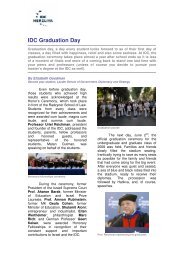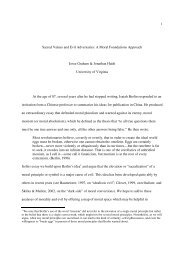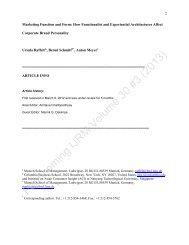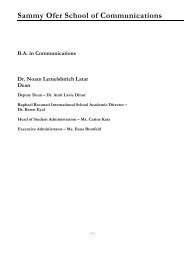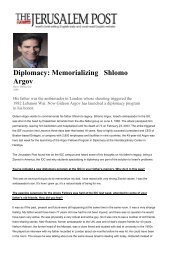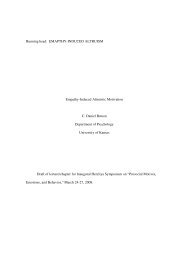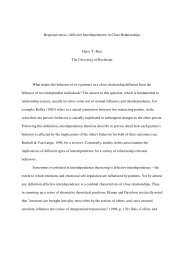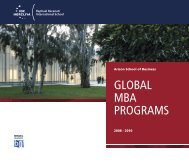The IDC
The IDC
The IDC
Create successful ePaper yourself
Turn your PDF publications into a flip-book with our unique Google optimized e-Paper software.
THE ROTHSCHILD CAESAREA CENTER<br />
THE CAESAREA CENTER BUSINESS CONFERENCE:<br />
A LOOK TO THE FUTURE OF THE GLOBAL CAPITAL MARKET<br />
AND RISK MANAGEMENT<br />
<strong>The</strong> sixth annual summit of the Rothschild Caesarea Center for Capital<br />
Markets and Risk Management at the <strong>IDC</strong> Herzliya facilitated a fascinating<br />
convention of researchers from the apex of the world academia, and indepth<br />
discussions on the subject of the future of the global capital market<br />
and risk management.<br />
Prof Jacob Boudoukh of the Rothschild Caesarea Center, David Scharfstein,<br />
a Harvard Professor of Financing and Banking, Craig Dawson, the Head<br />
of the Product Management Group at Pimco Europe, Avi Tyomkin, a<br />
consultant to Hedge Funds in the Global Macro field, Pierre Pourqouri, a<br />
Meir Baron, Prof. Jacob Boudoukh, Prof. Rafi<br />
Melnick, the Provost at <strong>IDC</strong><br />
Partner and Manager at the Boston Consulting Group, and Robert Houdin,<br />
the MD of Consulting and Credit Risk Management at Goldman Sachs,<br />
participated in the business conference.<br />
IT IS DIFFICULT TO KNOW AT PRECISELY WHAT STAGE<br />
WE ARE, VIS A VIS THE CURRENT RECESSION. WE ARE NO<br />
LONGER IN A STAGE OF PANIC, AS WE WERE IN SEPTEMBER<br />
AND OCTOBER 2008, BUT THE DANGER IS THAT WE ARE<br />
STILL IN THE THROES OF THE CRISIS, AS THE BANKS ARE<br />
NOT HOLDING SUFFICIENT CAPITAL IN ORDER TO RENEW<br />
LENDING ACTIVITIES AT THE LEVEL REQUIRED BY THE<br />
ECONOMY. - David Scharfstein, Harvard Professor of Financing and Banking<br />
David Scharfstein, a Harvard Professor of Financing and Banking, stated in<br />
his address that it is difficult to know at precisely what stage we are, vis a vis<br />
the current recession. According to him, we are no longer in a stage of panic,<br />
as we were in September and October 2008, but the danger is that we are<br />
still in the throes of the crisis, as the banks are not holding sufficient capital<br />
in order to renew lending activities at the level required by the economy.<br />
This situation is liable to last for several years. <strong>The</strong> true danger is that we will<br />
suffer from a lost decade, as did the Japanese economy, because the financial<br />
system is still deficient and is in dire need of raising a great deal of capital.<br />
<strong>The</strong> character of the banking system on the day after the crisis passes,<br />
Scharfstein said, depends to a large degree upon the stringency with which<br />
the US Federal Government will deal with the banks: “<strong>The</strong> character of the<br />
banking establishment in the future depends to a large extent upon the steps<br />
that the [US Federal] Government will take vis a vis regulation. Currently, it<br />
appears that they are progressing in the right direction, but if only cosmetic<br />
changes are made to the regulations, the banks will go back to pre-crisis<br />
40 < <strong>IDC</strong> Winter 2010<br />
Prof. Jacob Boudoukh and Prof.<br />
David Scharfstein<br />
business as usual. In contrast, should the [US Federal] Government make<br />
a real effort to gauge and manage risks and increase the capital adequacy<br />
requirements of the banks, in order to protect them from those same risks,<br />
we will have a far more stable financial system. Should the [US Federal]<br />
Government cave in to the political pressure that the financial institutes will<br />
surely apply to it, we will end up back at precisely the same point where we<br />
started.”<br />
<strong>The</strong> banks, says Scharfstein, are not exactly harnessing themselves to this<br />
change in the financial system. Over the past few weeks, a plethora of reports<br />
have surfaced indicating that the banks are interpreting the relative leniency<br />
that the US Federal Government is showing towards them as a sign that,<br />
when the crisis is over, they will be able to conduct business as they did prior<br />
to the outbreak of the crisis. Scharfstein too identifies signs indicating that<br />
the banks have not internalized the lessons: “I think that there is a great deal<br />
of hubris on Wall Street, and it is difficult to make it go away. Apparently the<br />
banks were not humiliated, as they really should have been.”<br />
“I THINK THAT THERE IS A GREAT DEAL OF HUBRIS ON<br />
WALL STREET, AND IT IS DIFFICULT TO MAKE IT GO AWAY.<br />
APPARENTLY THE BANKS WERE NOT HUMILIATED, AS THEY<br />
REALLY SHOULD HAVE BEEN.”<br />
- David Scharfstein, Harvard Professor of Financing and Banking<br />
Prof. Rafi Melnick, the Provost at <strong>IDC</strong> Herzliya, was not optimistic in his<br />
address, saying that according to all the indicators in his possession, all<br />
that is in evidence is the continued downfall. According to him, the most<br />
important detail from the point of view of Israel is international trade,<br />
because the main problem of the Israeli economy is the lack of ability to<br />
export to markets that are experiencing a crisis. For every percentage point<br />
of global trade, we have a percentage export and what the global trade<br />
development is predicting for is a decrease in export figures that is most<br />
perturbing.<br />
“THE MOST IMPORTANT DETAIL FROM THE POINT OF VIEW<br />
OF ISRAEL IS INTERNATIONAL TRADE, BECAUSE THE MAIN<br />
PROBLEM OF THE ISRAELI ECONOMY IS THE LACK OF<br />
ABILITY TO EXPORT TO MARKETS THAT ARE EXPERIENCING<br />
A CRISIS” - Prof. Rafi Melnick, the Provost at <strong>IDC</strong> Herzliya<br />
Avi Tyomkin<br />
According to Avi Tyomkin, a consultant to<br />
Hedge Funds in the Global Macro field, at the<br />
Global / Tigris Financial Group, the loss in the<br />
dramatic decline of liquidity prevalent in all<br />
markets worldwide, which causes very acute<br />
fluctuations, ejects many players from the<br />
system. Within a few years, the stock market<br />
will be a very marginal factor in any economic<br />
financial business thinking. <strong>The</strong>re will be this<br />
game of shares played in downtown New York<br />
or in Ahad Ha’am St. in Tel Aviv, but from the<br />
point of view of raising money, its influence and<br />
weight will be very marginal.<br />
THE CAESAREA CENTER ACADEMIC CONFERENCE<br />
<strong>The</strong> Academic Conference of the Rothschild Caesarea Center and the Arison<br />
School of Business was held for the sixth year running and discussed a<br />
range of papers in various fields of research of financial economics. A few<br />
example included the long term investment performance of commodities<br />
and its relation to the equity market, information contained in the term<br />
structure of interest rates for the conduct of monetary policy, the empirical<br />
record of market-based and accounting-based models for forecasting



